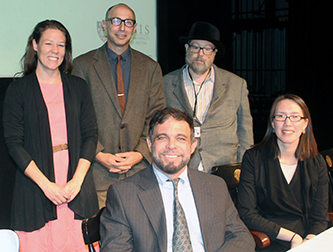 A panel of mental health experts explored schizophrenia and bi-polar disorders and addressed the increase in mental health diagnoses that affect more than one in 100 people throughout the world at the President’s Lecture Series on Health at Regis.
A panel of mental health experts explored schizophrenia and bi-polar disorders and addressed the increase in mental health diagnoses that affect more than one in 100 people throughout the world at the President’s Lecture Series on Health at Regis.
The forum, moderated by the Regis Psychology Program Director Helen Consiglio, PhD, attracted more than 250 people that included nurses, social workers, students and interested citizens.
Ann K. Shinn, MD, MPH, co-director at McLean On Track, and director of Clinical Research at Schizophrenia and Bipolar Disorder Research Program at McLean Hospital, explained how psychosis manifests in adolescence. The symptoms are disruptive and can lead to social isolation.
“As the gap between peers and one’s sense of self widen, it becomes harder to bridge the gap,” said Shinn. “Longer duration of untreated psychosis is associated with poorer outcomes. There is hope that early intervention in the initial years following a first episode can help individuals get back on track.”
Joseph Gonzalez-Heydrich, MD, director of the Developmental Neuropsychiatry Clinic at Boston Children’s Hospital, gave an example of a 13-year old patient who presented in the ER reporting that she is engaging “invisible friends” and re-enacting dangerous scenes. The ER psychiatric social worker diagnosed psychosis, however, another medical professional believed her diagnosis to be autism and refused a higher level of care, which led to her discharge. A week later, the patient returned to the ER where it was disclosed that she has two genetic conditions.
Howard Trachtman, BS, CPS, CPRP, co-founder and president emeritus of the National Alliance on Mental Illness and Greater Boston Consumer Advocacy Network, gave a consumers’ perspective on recovery and psychosocial rehabilitation. As a person who lives with psychosis, he described being diagnosed and shared his story of recovery that included many “dark days.” After acceptance and treatment, including learning coping skills, he is able to succeed and has “hopes and dreams” for his future.
Matthew A. Munich, PhD, LICSW, a social worker in private practice and adjunct professor at Salem State University School of Social Work, described the benefits of yoga as intervention for post-traumatic stress disorder in military and non-military populations, a disorder that can include symptoms of psychosis. Research, while limited, shows that yoga helps improve sleep quality and self-esteem and can reduce re-experiences of the trauma. As Munich suggested, what is important “is finding a qualified instructor, who can teach yoga across the lifespan, and can select the poses and techniques best suited for the target population.”
The Regis President’s Lecture Series on Health, which offers free contact hours for nurses and social workers, was established in 2007 and is hosted in partnership with Harvard Pilgrim Health Care. The series invites members of the public and the university community to participate in an exciting dialogue with health care leaders from government and the health professions. The series is one of the many ways the university fulfills its mission to boldly empower the next generation of leaders to change lives and be a force for good in the world. Save the dates for the spring lectures.


